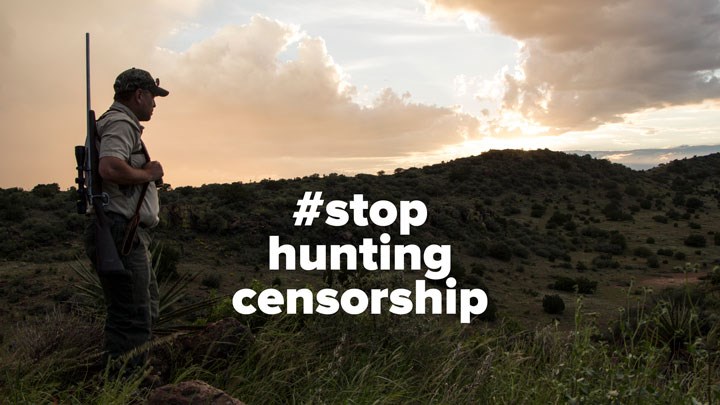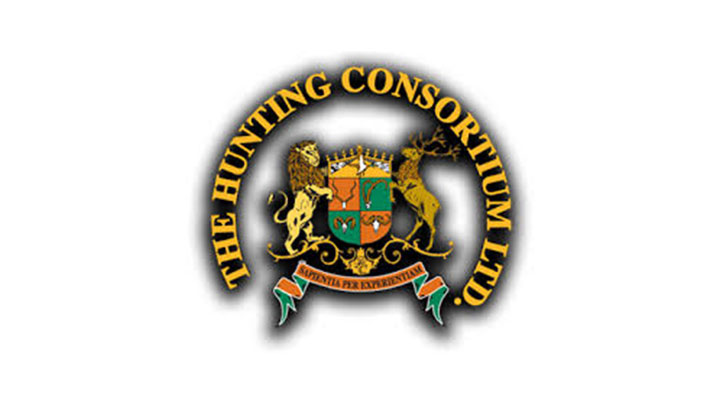
by Phil Phillips - Tuesday, February 16, 2021

If you wonder how serious the threat of Big Tech bias is to the future of hunters, hunting and conservative values, check out the reports about social-media censorship against us on any given day. While this NRA website actively tracks bias and death threats against hunters, I just came across another example, “#stophuntingcensorship,” from the America’s First Freedom website. Acknowledging how we hunters naturally enjoy posting comments and photos about our hunting adventures on platforms like Facebook, the article asks one of the most unsettling questions we face in the “cancel culture” era: “Is our virtual hunting campfire about to come to an end?” Under persecution this time was The Hunting Consortium LTD, a respected, generations-old international hunting consultancy in Berryville, Va., specializing in helping hunters to book their next worldwide adventure.
In this case, Facebook (FB) and its subsidiary, Instagram (IG), began targeting the prominent business in July 2020 when The Hunting Consortium (THC) Vice President Rob Kern noticed the company’s virtual library of hunting images suddenly was not accessible. Those who tried to access photos promoting adventures in the 60 countries that THC works with suddenly received pop-up messages saying the content violated “community standards.” Next FB blocked Kern from messaging hunters, and the company’s URL and email were shut down along with Kern’s personal email. FB ignored Kern’s inquiries so THC fought back by creating the #stophuntingcensorship social media campaign. Hunters and other hunter-backed companies got on board to help pressure FB and IG to cease censorship.
When Kern uncovered the issue, he said there was nothing posted in poor taste, and there were photos of other things besides hunters with their wild game. “There was scenery from wild places, camp photos, local people, conservation projects and even images from an African village school built with hunters’ dollars,” Kern explained. He said the booking agency was always mindful and proud of what it posted, adding, “Then it was all gone.” And all of it happened as THC was busy working to encourage hunters to postpone rather than cancel hunting trips amid the COVID-19 pandemic, protecting outfitter businesses and the future of wildlife conservation, which is funded in such a large part by hunters’ dollars.
When I contacted Kern this week to check on THC’s progress in fighting the social media giants, he said the battle continues, which takes a lot of time. As for the business that typically comes through social media that THC has lost, Kern said, “It’s brand marketing. It [social media] gets our name out there. Most of our business is referral, repeat clients, but to network or connect with the next generation we have no way to get info to the public.”
Emphasizing the importance of social media’s real-time interaction, Kern said the best way for him to get the word out is to get others to post his information. “If I post it, our reach is limited compared to posts from 2019, which were double,” he said. “There is still some funny business going on, though it appears normal, but we’re shadow-banned,” he added, referring to how his content is being blocked, though it is not readily apparent to him that he is banned and that friends are not seeing his posts. Of course, platforms like Facebook seem to be happy enough to take his advertising money.
And it’s even worse on Instagram. “On Instagram, we’re totally shut down,” said Kern. “I can’t respond to anybody—post pics or even post a pic with text. I must put text on the image.” He said the politically conservative content-analysis group Media Research Center (MRC) was a big help in getting out the news about THC. In fact, the MRC noted the company may have been singled out and made into an example because it is an influential and successful hunting business.
Kern believes THC content was removed by bottom-rung employees at FB and IG, who somehow have the freedom to block people and remove posts they don’t support. Sadly, we all heard about such behavior during the 2020 elections amid the push to silence conservatives. THC’s ongoing fight is a reminder to us all that it appears FB, IG and other social media platforms are testing the waters to see how the hunting community responds. Should we be prepared to fight back against increased censorship efforts against hunters and hunting, firearm and hunter-funded wildlife conservation businesses?
“I hope there is no fight coming but you never know,” Kern said. “We’ve got to be there in front of our clients, but they’re saying you can say this but not this. If you do, you’re done talking. I don’t know what the way forward really is. Our URL is still blocked on Facebook. When we get inquiries on Facebook, I can’t send an email. Emailing HuntingConsortium.com works, but people misspell it.”
Almost everyone we know uses some type of social media platform. I maintain the maximum 5,000 friends on my Phil Phillips Facebook page that I built while still doing guiding and outdoor TV. Now that I’m an associate broker for Hayden Outdoors and specialize in selling farm, ranch and recreational hunting properties, those friends are a part of how I stay connected and do business.
Backing up the claim about the prevalence of social media, a 2018 Pew Research Center (PRC) study revealed the following percentages on social media usage by age group: ages 18-29—88 percent; ages 30-49—78 percent; and ages 50-64—64 percent, a number that is still good considering this group didn’t grow up surfing the Web or posting, sharing, liking and commenting on social media. As the PRC noted, social media’s endless stream of communication has changed how we all absorb ideas and information. But again, as we strive to remain connected, it appears the biggest roadblock of all may be the social media companies that prefer to silence conservative voices.
Why are more and more of our hunting posts being taken down while FB, IG, Twitter and YouTube get to dictate what we can see and hear? As a May 2020 article in the New York post addressed, “Social media was intended to be a place where we were all free to express ourselves and share our views.” As the home of freedom, America isn’t a place where any of us should be blocked from sharing our views.

The Hunting Consortium continues to reach out to the hunting community on this issue and fight for all hunters. When you see hunters and hunt-based companies being policed in this way, stand with them and make others aware this is happening. The cancel culture is an attack on our freedom, and for many our livelihoods.
For more information, contact The Hunting Consortium at 540-955-0090 or click here to visit the website. See how you can help and, while you’re at it, book your next hunting adventure.
About the Author
NRA Life member, award-winning outdoor TV host and recreational real estate associate broker Phil Phillips has hunted five continents, taking more than 200 big-game animals and nearly 60 species worldwide. Prior to hosting hunting programs, he started Colorado's first Ranching for Wildlife Program for antelope, which he ran for 15 years. Working alongside professional land managers to restore wildlife and protect habitat, Phil went on to guide clients to 500-plus big-game animals that have qualified for the record book. In 1992 Safari Club International honored him as the North American Bowhunting Outfitter of the Year. Phillips writes regularly about hunting and predator issues, particularly those impacting his home state of Colorado. You can email him at [email protected].
E-mail your comments/questions about this site to:
[email protected]
